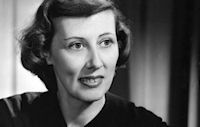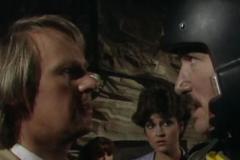An Unearthly Series - The Origins of a TV Legend
Wednesday, 17 July 2013 - Reported by Marcus

 The fourteenth in our series of features telling the story of the creation of Doctor Who, and the people who made it happen.
The fourteenth in our series of features telling the story of the creation of Doctor Who, and the people who made it happen.Production is progressing on the new series due for transmission on BBC Television in the Autumn. With key production personnel in place, attention has moved on to casting the main characters in the show.
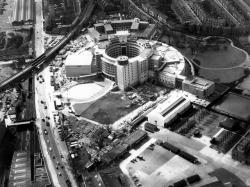 July 1963 was mostly cool and changeable as production at Television Centre in west London continued on the new television drama, which by now had a name, Doctor Who. Producing a television drama is a complicated thing, with so many departments needing to work together and so many people all needing to make sure their part of the puzzle would fit into the whole picture. One of the most important parts of the whole is design. Design in Television is vital, especially in science fiction drama where new worlds and future landscapes need to be created. The requirements for the new programme were enormous and producer Verity Lambert thought she was not getting the best out of the BBC design department.
July 1963 was mostly cool and changeable as production at Television Centre in west London continued on the new television drama, which by now had a name, Doctor Who. Producing a television drama is a complicated thing, with so many departments needing to work together and so many people all needing to make sure their part of the puzzle would fit into the whole picture. One of the most important parts of the whole is design. Design in Television is vital, especially in science fiction drama where new worlds and future landscapes need to be created. The requirements for the new programme were enormous and producer Verity Lambert thought she was not getting the best out of the BBC design department.Lambert had been pressing the Design Manager James Bould and Head of Design Richard Levin to allocate a designer to the new series since the end of June, but it was not until Wednesday 10th July that Lambert was finally given a name. The first four episodes would be designed by Peter Brachacki. That day, Lambert and Associate Producer Mervyn Pinfield had a meeting with Brachacki. It was not a total meeting of minds as it was obvious Brachacki was not keen on working on the series. He could spare them half an hour and announced he would be unavailable for the next two weeks.
This was something that worried Lambert, and after reflecting on the situation, on Wednesday 17th July, exactly 50 years ago today, she sent her boss, Donald Wilson, a memo outlining her concerns and expressing a wish that the production should not suffer 'because of a lack of effort from the Design department'. Wilson took up the matter and wrote to the Head of the Design department.
If the circumstances are as reported in Miss Lambert's note, it seems to me that this project, which is designed to run 52 weeks, is not getting the necessary attention. We are constantly being asked for earlier information to help in design problems; the information is available, and has been available for some time. I would like to ask you now that one designer for the whole project of 52 weeks be agreed with Miss Lambert, with whatever assistance may be required, because we shall wish to maintain the same style of design throughout, however varied the stories may be.
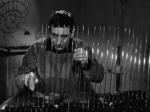 Music is another vital element in a television drama and Lambert was determined to try something different on this series. On Friday 12th July she made enquiries about commissioning the French electronic music composers Jacques Lasry and Francois Bascher to provide the title music for the series. Their group, Les Structures, were known for creating music using such techniques as glass rods mounted in steel.
Music is another vital element in a television drama and Lambert was determined to try something different on this series. On Friday 12th July she made enquiries about commissioning the French electronic music composers Jacques Lasry and Francois Bascher to provide the title music for the series. Their group, Les Structures, were known for creating music using such techniques as glass rods mounted in steel.By the middle of July, Script Editor David Whitaker had refined the original concept document, making significant changes to the character structure. Whitaker made clear in his changes that the main cast would be forbidden from interfering with history. The character of the Doctor was now described as 'over sixty' rather than 'about 650' and his granddaughter, Susan, was to be a 'sharp intelligent girl who sometimes makes mistakes because of inexperience'. He made notes on the spaceship that would feature in the programme.
Doctor Who has a 'ship' which can travel through space, through time and through matter. It is a product of the year 5733 and cannot travel forward from that date (otherwise the Doctor and Sue could discover their own destinies), the authorities of the 50th Century deeming forward sight unlawful. This still enables Ian and Barbara (and the audience) to see into environments and existences far beyond the present day. The ship, when first seen, has the outward appearance of a police box, but the inside reveals an extensive electronic contrivance and comfortable living quarters with occasional bric-a-brac acquired by the Doctor in his travels. Primarily, the machine has a yearometer, which allows the traveller to select his stopping place. In the first story, however, the controls are damaged and the ship becomes uncertain in performance, which explains why Ian and Barbara, once set upon their journey, are never able to return to their own time and place in their natural forms.
The actual scripts for the first 10 episodes, now confirmed at a duration of 25 minutes, were still being worked on by Anthony Coburn. He signed the formal contract on 8th July and would be paid £225 for each episode. The contract made it clear that the concept of Doctor Who and its four main characters would remain the copyright of the BBC and not belong to Coburn. Coburn's fee would be paid in 12 instalments.The story structure for those first ten episodes was also outlined by Whitaker.
The first story of four episodes, written by Anthony Coburn, begins the journey and takes the four travellers back in time to 100,000 BC to mid-Palaeolithic man, and it is in this story that the 'ship' is slightly damaged and forever afterwards is erratic in certain sections of its controls.
The second series of six episodes, written by Anthony Coburn, takes the travellers to some time approximately near the 30th Century, forward to the world when it is inhabited only by robots, where humanity has died away. The robots themselves, used to a life of service, have invented a master robot capable of original thought but, realising the dangers, have rendered their invention inoperative, even though it means they must sink into total inertia. The travellers, unaware of this situation, bring the robots and then the new invention 'to life' and face the dangers inherent in a pitiless computer.
The second series of six episodes, written by Anthony Coburn, takes the travellers to some time approximately near the 30th Century, forward to the world when it is inhabited only by robots, where humanity has died away. The robots themselves, used to a life of service, have invented a master robot capable of original thought but, realising the dangers, have rendered their invention inoperative, even though it means they must sink into total inertia. The travellers, unaware of this situation, bring the robots and then the new invention 'to life' and face the dangers inherent in a pitiless computer.


SOURCES: The Handbook: The First Doctor – The William Hartnell Years: 1963-1966, David J Howe, Mark Stammers, Stephen James Walker (Doctor Who Books, 1994)
 Doctor Who once more features heavily in the
Doctor Who once more features heavily in the  Visitors travelling through Heathrow Airport in London from Tuesday are to be entertained with a range of Doctor Who themed experiences including appearances from Cybermen, TARDIS photobooths, displays of props and memorabilia, and augmented reality hotspots.
Visitors travelling through Heathrow Airport in London from Tuesday are to be entertained with a range of Doctor Who themed experiences including appearances from Cybermen, TARDIS photobooths, displays of props and memorabilia, and augmented reality hotspots. 

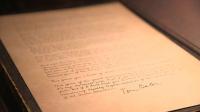


 I have always loved Doctor Who - from the time I was a child and the Daleks used to make me run and hide behind the sofa, to Saturday morning pictures when I first saw the Doctor Who films featuring Peter Cushing, right up to the current Doctor with Matt Smith. So when I was asked to write a Doctor Who story featuring the seventh Doctor, Sylvester McCoy, I didn't even need to pause to think about it. My answer was an immediate yes.
I have always loved Doctor Who - from the time I was a child and the Daleks used to make me run and hide behind the sofa, to Saturday morning pictures when I first saw the Doctor Who films featuring Peter Cushing, right up to the current Doctor with Matt Smith. So when I was asked to write a Doctor Who story featuring the seventh Doctor, Sylvester McCoy, I didn't even need to pause to think about it. My answer was an immediate yes. 


